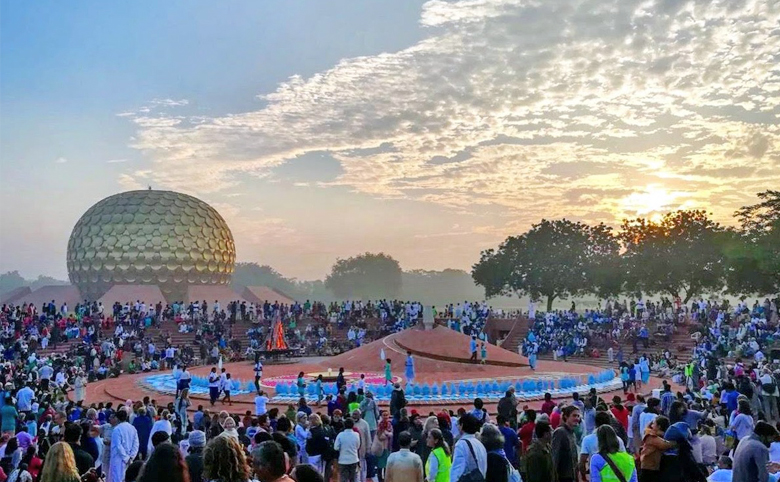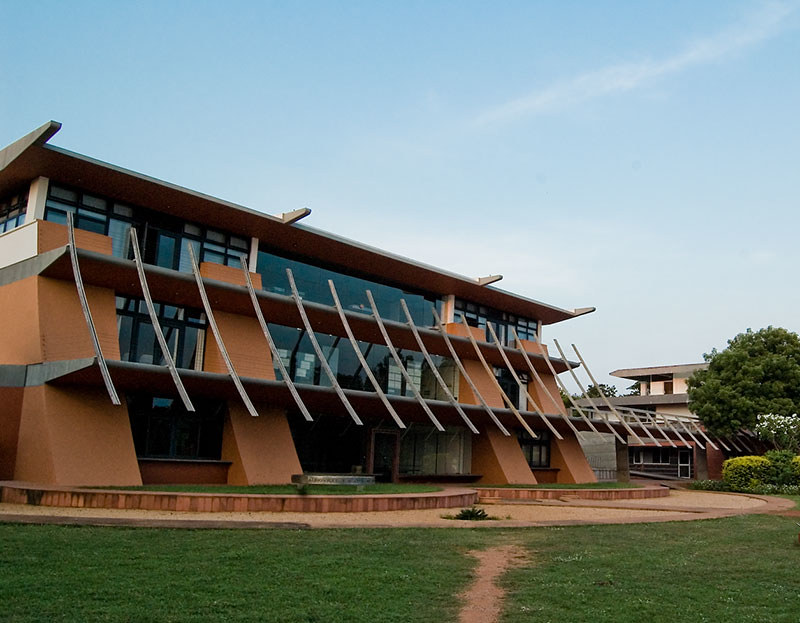Collective Property

In a truer world, towards the realization of which the creation is moving, money ought to be one of the terrestrial forces placed at the disposal of the Divine Consciousness for its work upon earth.
Money: A Tool for Progress, Not a Possession
All wealth belongs to the Divine and those who hold it are trustees, not possessors. It is with them today, tomorrow it may be elsewhere. All depends on the way they discharge their trust while it is with them, in what spirit, with what consciousness in their use of it, to what purpose.
--Sri Aurobindo, CWSA 32, The Mother, 1927
Auroville is the ideal place for those who want to know the joy and liberation of not having personal possessions anymore.
-- The Mother, CWM XIII, 18 Sept 69

Money & Wealth Management
At Auroville, nothing belongs to anyone in particular. All is collective property. To be utilised with my blessings for the welfare of all.
-- The Mother, CWM XIII, 14 May 70
The Aurovilian should lose the sense of personal possession. For our passage in the material world, what is indispensable to our life and to our action is put at our disposal according to the place we must occupy. The more we are consciously in contact with our inner being, the more are the exact means given to us.
-- The Mother, To Be a True Aurovilian, CWM XIII, 13 June 1970
Money is a force and should not be an individual possession, no more than air, water of fire. To begin with, the abolishment of inheritance.
--- The Mother, Agenda V1, 1958
Apropos Auroville: On Money and Government
The conflict about money is what might be called a “conflict of ownership”, but the truth is that money belongs to no one. This idea of possessing money has warped everything. Money should not be a “possession”: like power it is a means of action which is given to you, but you must use it according to… what we can call the “will of the Giver”, that is, in an impersonal and enlightened way. If you are a good instrument for diffusing and utilising money, then it comes to you, and it comes to you in proportion to your capacity to use it as it is meant to be used. That is the true mechanism.
The true attitude is this: money is a force intended for the work on earth, the work required to prepare the earth to receive and manifest the divine forces, and it―that is, the power of utilising it―must come into the hands of those who have the clearest, most comprehensive and truest vision.
To start with, the first thing (but this is elementary) is not to have the sense of possession―what does it mean, “it is mine”?… Now, I don’t quite understand. Why do people want it to belong to them?―so that they can use it as they like and do what they want with it and handle it according to their own conceptions? That’s how it is. On the other hand, yes, there are people who like to store it up somewhere… but that is a disease. To be sure of always having some, they hoard it.
But if people understood that one should be like a receiving and transmitting station and that the wider the range (just the opposite of personal), the more impersonal, comprehensive and wide it is, the most force it can hold (“force” that is translated materially: notes and coins). This power to hold is proportional to the capacity to use the money in the best way―”best” in terms of the general progress: the widest vision, the greatest understanding and the most enlightened, exact and true usage, not according to the warped needs of the ego but according to the general need of the earth for its evolution and development. That is to say, the widest vision will have the largest capacity.
Behind all wrong movements, there is a true movement; there is a joy in being able to direct, utilise, organise in such a way that there is a minimum of waste and the maximum of result. It is a very interesting vision to have. And this must be the true side in people who want to accumulate money: it is the capacity to use it on a very large scale. Then, there are those who very much like to have it and spend it; that is something else―they are generous natures, neither regulated nor organised. But the joy of being able to satisfy all true needs, all necessities, is good. It is like the joy of changing a sickness into health, a falsehood into truth, a suffering into joy; it is the same thing: to change an artificial and foolish need―which does not correspond to anything natural―into a possibility which becomes something quite natural. So much money is needed to do this or that or the other, so much is needed to arrange this, to repair that, to build this, to organise that―that is good. And I understand that people like to be the channels through which the money goes exactly where it is needed. That must be the true movement in people who like to… translated into foolish egoism, who need to appropriate.
When the need to accumulate and the need to spend (which are both blind and ignorant) are combined, they can lead to a clear vision and a most efficient utilisation. That is good.
Then there comes, slowly and slowly, the possibility of putting it into practice.
But, naturally, the need is for very clear heads and for intermediaries of high integrity (!) to be able to be everywhere at the same time and do all at the same time. Then this famous question of money would be solved.
Money does not belong to anybody. Money is a collective possession which should be used only by those who have an integral, comprehensive and universal vision. I would add something to that: not only integral and comprehensive, but essentially true as well; a vision which can tell the difference between a use which is in accord with the universal progress, and a use which could be termed fanciful. But these are details, for even the mistakes, even, from a certain standpoint, the waste, help the general progress: these are lessons learned the hard way.
- The Mother, CWM XIII, 10 April 68

In a truer world, towards the realisation of which the creation is moving, money ought to be one of the terrestrial forces placed at the disposal of the Divine Consciousness for its work upon earth.
The first step towards this realisation is the abolition of the sense of ownership. No one is the possessor of the money in his hands, he is the user and distributor of that money. And this leads naturally to the next step: those who have the widest and truest vision and knowledge ought to become these distributors and users.
The methods for achieving this have to be worked out and put into practice according to the need and the possibilities.
--The Mother, CWM XIV, 29 June 1969
